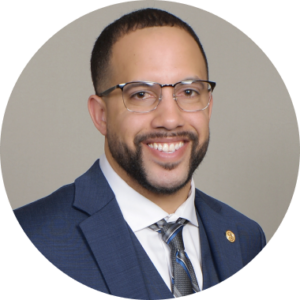The WestEd Justice and Prevention Research Center team brings leading nationwide experience and deep expertise to significant questions and issues related to justice, crime and violence prevention, public health, and safety for children, young adults, and communities.
We conduct rigorous research and evaluation work and are a trusted source of evidence on the effects of policies and programs in these areas.
In addition to conducting research and evaluation studies, we promote the use of scientific evidence in making decisions about programs, policies, and practices relevant to justice and prevention.
Senior Leaders
Our Research and Technical Assistance Staff
Our Distinguished Advisors

David Farrington
David Farrington, Professor Emeritus of Psychological Criminology at the Institute for Criminology, Cambridge University, in the United Kingdom, will serve as an Adviser to the Center. Recognized as one of the top criminologists in the world, Professor Farrington has authored over 100 books, monographs and government reports as well as over 700 journal articles and book chapters on crime and justice. His full biography can be found here. Professor Farrington currently serves as a consultant on the National Institute of Justice funded study of the No Bully System in the Oakland Unified School District, a project led by WestEd’s Health and Human Development Program and including the JPRC.

Anthony Petrosino
Anthony Petrosino is the Director and also serves as Senior Fellow and Affiliated Faculty at George Mason University’s Center for Evidence-Based Crime Policy. He has more than 35 years of experience collaborating on research and evaluation projects and has co-authored more than 150 articles, book chapters, and technical reports. Anthony was elected Honorary Fellow by the Academy of Experimental Criminology in 2005, received the Paul D. Hood Award for Distinguished Contribution to the Field from WestEd in 2011, and the Robert F. Boruch Award for Contributions to Public Policy from the Campbell Collaboration in 2018.

Brenda Henry
Brenda Henry is Chief Operating Officer for the Division of Early Care and Education in New York City’s Administration for Children’s Services (ACS). Dr. Henry joined ACS in June 2015 and plays a critical role in developing, coordinating, and administering comprehensive Division-wide performance improvement and capacity-building strategies. As a member of the executive leadership team, she leads efforts to increase the efficiency and effectiveness of the Division’s systems and processes, with an eye towards continuous quality improvement to maximize outcomes for the children and families that the Division serves.
Prior to ACS, Dr. Henry was Director of Research for Special Projects at Foundation Center. In that role, she developed and directed regional, national, and international research and consulting projects on a wide range of philanthropic issues. Prior to Foundation Center, Dr. Henry was a senior program officer with the Robert Wood Johnson Foundation and played an instrumental role in launching the County Health Rankings and Roadmaps initiative and led the foundation’s review of its public health grant-making portfolio.
Dr. Henry’s extensive research and evaluation background includes positions at HighScope Educational Research Foundation, University of Michigan, Memorial Sloan-Kettering Cancer Center, and Joseph L. Mailman School of Public Health at Columbia University. Dr. Henry earned both a Ph.D. and M.P.H in health behavior and health education from the University of Michigan. When not in the office, she enjoys dining out, watching movies, playing softball, and biking along the Hudson River with her husband Safiy.

William Modzeleski
William “Bill” Modzeleski brings over 40 years of experience working on issues affecting the health and well being of children and youth. During this time he has served in numerous capacities and on a host of various issues. His experiences ranged from serving as a probation officer to staffing several Federal Task Forces (White House Conference on Drug Free America, Attorney General’s Task Force on Family Violence) and from a specialist on juvenile justice issues (at the Office of Juvenile Justice) to Associate Assistant Deputy Secretary at the Department of Education’s Office of Safe and Drug Free Schools.
Mr. Modzeleski has been involved in addressing numerous issues, including: school safety /school shootings, health crises such as H1N1, violent extremism, alcohol and drug prevention, and assisting schools recover from natural and man-made disasters.
Mr. Modzeleski has been instrumental in the design of many innovative programs and studies including: the Safe School Initiative (with Secret Service), the Safe Schools/Healthy Students Initiative (with HHS and OJJDP), the School Associated Violent Death Study (with CDC), Threat Assessment Guide (with Secret Service), and Targeted Attacks at Institutions of Higher Education (with FBI and Secret Service).
Mr. Modzeleski’s career also involved service in the U.S. Army, where he earned the Bronze Star for Meritorious Service while stationed in Viet Nam.

Herb Turner
Dr. Herb Turner is an Adjunct Associate Professor at the University of Pennsylvania Graduate School of Education’s Quantitative Methods Division, where he teaches graduate-level courses in statistics and statistical programming. He has over 30 years of experience conducting empirical investigations consistent with scientifically valid research in education and related areas. Dr. Turner is Founder, President, and Principal Scientist of ANALYTICA, Inc., a woman-owned and minority-led small business that specializes in using scientifically-valid research methods to address policy-relevant education problems. During the past decade, he contributed to innovative and cutting-edge initiatives designed to transform education research into an evidence-based, scientifically valid field. These initiatives include the Campbell Collaboration (C2); the What Works Clearinghouse (WWC); the Regional Educational Laboratory (REL) Program; and most recently the Investing in Innovation (i3) program and the WWC Post-Secondary reviews.

David Weisburd
David Weisburd is a Distinguished Professor at George Mason University and Executive Director of the Center for Evidence-Based Crime Policy. He also holds a joint appointment as the Walter E. Meyer Professor of Law and Criminal Justice at the Hebrew University Faculty of Law in Jerusalem. He also serves as a Chief Science Advisor at the Police Foundation in Washington DC and is Chair of its Research Advisory Committee. Professor Weisburd is an elected Fellow of the American Society of Criminology and of the Academy of Experimental Criminology. He is a member of the Science Advisory Board of the Office of Justice Programs, the Steering Committee of the Campbell Crime and Justice Group, and the Scientific Commission of the International Society of Criminology. He is also the Chair of the National Academy of Sciences Committee on Proactive Policing. Professor Weisburd is one of the leading international researchers in crime and justice. He is author or editor of more than twenty five books and more than 175 scientific articles that cover a wide range of criminal justice research topics, including crime at place, violent crime, white collar crime, policing, illicit markets, criminal justice statistics and social deviance. Professor Weisburd was the founding Editor of the Journal of Experimental Criminology and is General Editor of the Journal of Quantitative Criminology. He is the 2010 recipient of the Stockholm Prize in Criminology and the 2011 recipient of the Klachky Prize for the Advancement of the Frontiers of Science. In 2014 he received the Jerry Lee Award for Lifetime Achievement in Experimental Criminology from the Division of Experimental Criminology (ASC), the Robert Boruch Award for distinctive contributions to research that influences public policy of the Campbell Collaboration, and the American Society of Criminology’s Sutherland Award. In 2015 he received the Israel Prize, generally regarded as the State of Israel’s highest honor, for his contributions to criminology.

Nisha Bala
Nisha Bala is a Research Associate. They are on the California Center for School Climate team; they also perform analyses on the California Healthy Kids Surveys (CHKS) and assist with other data management and analysis needs. Bala also provides technical assistance and consultation on data use practices to county offices of education, districts, and schools. Prior to joining WestEd, Bala worked at the Tennessee Education Research Alliance, a research-practice partnership between the Tennessee Department of Education and Vanderbilt University. They were part of a team analyzing administrative, survey, and testing data in the 2020/21 academic year and specialized in student survey data analysis. Bala received bachelor’s degrees in mathematics and economics from the University of Chicago and a master’s degree in public policy from Vanderbilt University. Bala has worked in alternative education systems and is passionate about international (especially South Asian and West African) topics, youth politics, and LGBTQ+ topics, especially regarding trans and non-binary kids.

Shaun Ali
Shaun Ali is a Senior Justice Technical Assistance Specialist currently helping Second Chance Act grantees and state education agencies through the National Reentry Resource Center to Improve Social Emotional Learning and School Safety (CISELSS). Prior to joining WestEd, Ali supported two Office of Juvenile Justice and Delinquency Prevention (OJJDP) grants focused on youth violence prevention. Ali started his career in criminal justice as a victim liaison for the U.S. Department of Justice, Criminal Division, Fraud Section. After that, he worked with state, local, and tribal justice agencies through the Bureau of Justice Assistance National Training and Technical Assistance Center. Ali served as a key consultant for a large-scale transformation project for all the justice agencies of Riverside County, California, and has volunteered in the prevention of radicalization and school discipline reform efforts in his local community. Ali received a master’s in sociology from Arizona State University and a bachelor’s in criminal justice from George Mason University.

Jeremy Richman
Dr. Richman, a neuro-pharmacologist with more than 20 years of research and drug discovery experience, died on March 25, 2019. His studies spanned the range from neuroscience to cardiovascular biology, diabetes, obesity, metabolic syndrome, immunology and inflammation, and kidney disease. He was passionate about helping people live happier and healthier lives and was dedicated to engaging and educating youth, believing that our future relies on their imaginations. This is manifest in his having taught martial arts, biology, neuroscience, and rock climbing to children and teens for the past 25 years. Most importantly, he believed it was critical to empower youth to advocate for themselves and their peers when it comes to brain health and brain illnesses. Following the murder of his six year old daughter, Avielle, in the Sandy Hook Elementary School murders, Dr. Richman and his wife, Jennifer Hensel, started the Avielle Foundation, committed to preventing violence and building compassion through brain health research, community engagement, and education. Dr. Richman served as the CEO of the Avielle Foundation and also had a Faculty Lecturer appointment in the Department of Psychiatry at Yale’s School of Medicine.

Trent Baskerville
Trent Baskerville is a Research Associate. He has an extensive background in qualitative analysis, data collection, community outreach, and information synthesis in criminal justice, inequality, and violence prevention. His research covers a diverse background that provides him with an in-depth understanding of the juvenile and adult justice system, school safety, violence prevention, and public health implications. Prior to joining WestEd, Baskerville served 10 years in the United States Army, including multiple tours in Afghanistan. During his tenure, he received various awards for his academic achievements: Commandants List, Basic Leaders Course (2016); Distinguished Leadership Awardee, Advanced Leaders Course (2016); and Commandants List, Recruiting and Retention College (2018). Baskerville graduated summa cum laude with his BA in political science with a concentration in international relations from American Military University. He also holds a master of public policy from the University of California, Riverside, School of Public Policy.

Ashley Boal
Ashley Boal is a Senior Research Associate. She brings experience directing and coordinating complex, multi-year projects that rely on collaboration and coordination with diverse shareholders. Dr. Boal is well-versed in the integration of quantitative and qualitative methodologies and has experience designing and executing mixed-methods projects. She has worked on projects that span diverse content areas, including criminal justice, violence against women, mental and physical health, substance use, and education. Boal is the co-investigator for two studies funded by the National Institute of Justice, one on state school safety centers and the second on law enforcement training related to internet crimes against children. Her work has been published in prominent academic journals, including Psychological Assessment, American Journal of Preventive Medicine, American Journal of Community Psychology, Nicotine & Tobacco Research, and Violence and Victims.

Josh Carmouche
Josh Carmouche is a School Safety Technical Assistance Specialist. He holds a Master’s degree from Loyola University New Orleans and has earned peer-refereed
credentials including Certified Emergency Manager (IAEM) and Certified Protection Professional (ASIS). A TCOLE Master Peace Officer and Mental Health Officer, Josh remains an active police officer.
At WestEd, Josh provides evidence-based safety and security guidance to K-12 school districts nationwide. Previously, his tenure as Program Manager at the Texas School Safety Center saw him leading multi-disciplinary teams in tailoring classical emergency management, physical security, and behavioral threat assessment strategies for the K-12 and junior college audiences. Josh has experience as both a street-level police officer and as a police supervisor in both municipal and educational settings. His experience has prompted him to regularly create and test emergency plans and respond to various hazards. Josh continues his role as faculty at Texas State University,
University of Louisiana/Lafayette, and City University of Seattle, teaching a wide variety of undergraduate courses to Criminal Justice students.

Jeff Caldwell
Jeff Caldwell is a Senior Lead in School Safety. As the former Associate Director of School Safety Readiness at the Texas School Safety Center, he was involved in the creation and implementation of statewide initiatives for school safety. His diverse career includes municipal government, private industry, and over 25 years of law enforcement experience as a school resource officer, chief of police, and city marshal. Caldwell’s municipal government experience includes roles as a city administrator and as director of various divisions, including emergency management, code enforcement, and the health department. His private industry experience includes facilitating professional development and personal growth training, team leading for permitting and entitlements with an engineering and architecture company, and consulting. Caldwell has a degree from Texas State University and numerous hours attending and facilitating training in law enforcement, safety and security, leadership, and personal growth.

Colleen Carter
Colleen Carter is a Research Associate contributing to research and program evaluations related to youth voice, juvenile justice, teen pregnancy, crime prevention, and social-emotional health. Carter serves as a liaison to diverse partnerships within juvenile justice agencies and community-based organizations. Her responsibilities include data collection, site visits, survey development, database management, analysis, and product dissemination. Carter received a MS in public health from Tulane University and a BS in wildlife biology from Cal Poly Humboldt.

Trevor Fronius
Trevor A. Fronius is a Senior Research Associate. He brings more than a decade of experience conducting research and evaluation projects in justice, school safety and climate, violence prevention, and public health sectors. These projects include experimental and quasi-experimental studies focusing on issues such as school-based law enforcement and threat assessment, chronic absenteeism, community-based violence, reentry, and systems-involved and opportunity youth. In addition, his past work includes research on social capital and community violence as well as published research reviews of restorative justice in schools, school-based policing programs, and community-based violence prevention strategies. Fronius received his master of science in criminal justice studies from Bridgewater State University and his PhD in criminology and criminal justice studies from the University of Massachusetts at Lowell.

Sarah Guckenburg
Sarah Guckenburg, MPH, is a Senior Research Associate. She has led and collaborated on various research and evaluation projects focusing on violence prevention, juvenile justice reform, school safety, and other public health issues. Guckenburg’s current projects include the evaluation of the Advancing Wellness and Resiliency in Education (AWARE) project in Vermont, a grant working to support system-level improvements for school-based mental health services in three school districts, an evaluation of alcohol and drug prevention programs in Montgomery County, Pennsylvania, and case studies of youth advisory councils in juvenile justice settings funded by the Annie E. Casey Foundation.

Kerwin Henderson
Kerwin Henderson, MS, is a Senior Justice Technical Assistance Specialist specializing in technical assistance in violence prevention and reform of justice systems. He has more than 10 years of experience addressing critical issues and implementing reforms across the criminal justice system. Henderson has managed the implementation of evidence-based programs and practices in juvenile and adult justice systems and addressed issues in reentry, including race and gender disparities in treatment. At national and international conferences, he has presented on juvenile justice and the issues of military veterans. He has also worked directly with state and local leaders to improve decision-making and reduce incarcerated populations. Henderson received his BS from Quincy University, Illinois, and his MS from the University of Cincinnati, both in criminal justice.

Curtis Herring
Curtis Herring, MEd, is a School Safety Technical Assistance Specialist with the WestEd Justice and Prevention Research Center. He supports local, regional, and state education agencies in their implementation of evidence-based violence prevention strategies. Herring began his work in education in 2013 as a high school science teacher and progressed to the Director of Counseling and Student Support for Comal ISD (Texas) before coming to WestEd. His work has included several notable projects, such as the development of a campus mindfulness room, the introduction of processes and procedures related to Behavioral Threat Assessment, the development of a campus-based mentorship program, and the institution of school counseling data collection and analysis methods. In his more recent role serving as the Director of Counseling and Student Support, Herring oversaw certified school counselors, licensed social workers, and licensed professional counselors at 34 campuses, leading the continual development of a robust school-based mental health framework and comprehensive school counseling program. Curtis received his MEd in educational psychology from Texas A&M University and his BS from the University of Texas at San Antonio.

Arena Lam
Arena C. Lam is a Senior Research Associate. Lam works on evaluations related to criminal and juvenile justice, teen pregnancy prevention, human trafficking, school-based health services, college affordability, and teacher preparation. She has extensive experience analyzing complex criminal justice and education data of various research designs (randomized controlled trials, quasi-experimental, longitudinal, and cross-sectional). Lam utilizes analytic techniques such as survival analysis, regression, hierarchical linear modeling, structural equation modeling, and person-centered approaches as part of her work in evaluation studies and publications in peer-reviewed journals. Lam received a master’s degree and PhD in education from the University of California, Irvine.

Jennifer Loeffler-Cobia
Jennifer Loeffler-Cobia is the Justice and Public Health Policy and Practice Director. She is also an Adjunct Associate Professor at the Bovard College at the University of Southern California where she teaches system thinking to solve complex public health and criminal justice issues. She has over 20 years of experience conducting evaluation studies, particularly in areas relevant to juvenile and adult criminal justice evidence-based practices, substance misuse prevention and intervention, violence prevention, and public health. She is an experienced technical assistance (TA) provider and has directed numerous TA centers, such as the National Reentry Resource Center and Children Exposed to Violence TTA Center, funded by the U.S. Department of Justice. She has served as a subject matter expert and researcher on studies funded by various organizations, including the U.S. Department of Justice, the U.S. Department of Education, and the Substance Abuse and Mental Health Services Administration. She has also conducted Capitol Hill briefings for the U.S. Congress regarding the application of criminal justice and public health policy reforms in real-world settings. She received both her Bachelor of Science in Public Health and Master of Science in Health Research and Evaluation from Utah State University and Doctorate in Public Health from University of South Florida.

Pamela MacDougall
Pamela MacDougall is a Senior Program Coordinator. She works closely with project teams to ensure that deliverables are met. She monitors budgets, organizes and monitors field research, schedules interviews and project activities, develops online questionnaires, analyzes and synthesizes survey data, contributes to evaluation reports and proposal writing, and conducts background research as well as quantitative and qualitative data analyses. MacDougall also works with projects to develop and maintain databases to organize, manage, and present information and data. She received a bachelor of science in liberal arts with a concentration in legal ethics from Salem State University.

Danielle Munguia
Danielle Munguia is a Research Assistant with the WestEd Justice and Prevention Research Center. Before joining WestEd, she worked for the Los Angeles County Department of Health Services as an assistant on the COVID-19 Response Team serving housing shelters and people experiencing homelessness. At the height of the pandemic, Munguia had a dual position as the COVID-19 Response Specialist for the Hope of the Valley Rescue Mission, where she worked with the LA County Department of Public Health to facilitate COVID-19 outbreak investigations and quarantine/isolation measures. Munguia also volunteers as a crisis counselor at Didi Hirsch’s Mental Health Services: Suicide Prevention Center. Her research interests align with alleviating the burden of serious mental illnesses amongst marginalized groups. Munguia is excited to be at WestEd and looks forward to sharpening her research skills while continuing to network with diverse researchers. She has a bachelor’s degree in psychobiology from the University of California, Los Angeles.

Ericka Muñoz
Ericka Muñoz is a Research Associate. Muñoz works on various projects, including Santa Ana Unified School District’s (SAUSD) Conexiónes program funded by Proposition 47. She is also a Lead Research Consultant working on Proposition 47 efforts with the Los Angeles County Office of Diversion and Reentry’s Skills and Experience for the Careers of Tomorrow (SECTOR) program. Muñoz’s roles across both projects include conducting interviews, developing focus group protocols, facilitating focus groups with service providers and/or service recipients, quantitative and qualitative analysis, assisting with report writing, and developing infographics, including ArcGIS maps. Previously, Muñoz was also a Lead Data Analyst on Proposition 47-funded efforts at Project Kinship, a reentry nonprofit. In her role as Lead Data Analyst, Muñoz worked with the Adult and Older Adult Behavioral Health Services division at the Orange County Health Care Agency and the SAUSD to develop the data infrastructure of two behavioral health programs, Safe Haven and Conexiónes, for adults and youth experiencing substance use and mental health issues with the goal of decreasing recidivism. Muñoz’s passion for social justice and criminal justice reform stems from her experience as a first-generation Mexican American system-impacted individual.

Jonathan Nakamoto
Jonathan Nakamoto is a Senior Research Associate. He is the director of an evaluation of Project With, which is a teen pregnancy prevention program that is implemented with justice-involved youth residing in Los Angeles County Probation Department facilities and group homes in Southern California. The evaluation uses a quasi-experimental design to rigorously examine the program’s impact on the participating youth. Previously, Nakamoto led a cost analysis of another teen pregnancy prevention program, Healthy U, which our team helped implement in juvenile justice facilities in Oregon. Additionally, Nakamoto co-authored a peer-reviewed publication on the impacts of Healthy U based on a rigorous cluster-randomized controlled study. Nakamoto has used experimental and quasi-experimental research designs to evaluate the impact of various education interventions. His published work in peer-reviewed journals has employed several analytic techniques, including hierarchical linear modeling, structural equation modeling, multiple imputation, and meta-analysis. Nakamoto received a master’s degree and PhD in developmental psychology from the University of Southern California.

Sarah Russo
Sarah Russo is a Research Associate. Ms. Russo leads and conducts a variety of research and program and evaluation activities in the areas of justice, education, and healthy communities. Responsibilities include but are not limited to project management, qualitative and quantitative data collection, data analysis, and reporting. Her projects include evaluations of teen pregnancy prevention and other initiatives for justice-involved youth, programs addressing human trafficking among transition-aged youth, training for law enforcement investigating technology-facilitated crimes against children, and state school safety centers. Prior to her work at WestEd, Ms. Russo served as the lead data analyst for the Community-Based Crime Reduction grant initiative in Los Angeles to develop violent crime prevention and reduction strategies in MacArthur Park. Ms. Russo earned a BA in sociology from the University of Pennsylvania.

Alexis Stern
Alexis Stern is a Research Associate. She contributes to research and evaluation projects in areas including juvenile justice reform, school climate, and public health. Her work at WestEd has included supporting a case study of a juvenile justice youth advisory council, a report on school climate and suspensions in California schools, and an evaluation of a framework for school-based law enforcement in Texas. Stern received a master’s degree in urban education policy from Brown University.

Hannah Sutherland
Hannah Sutherland is a Research Associate. Sutherland’s responsibilities include various research and evaluation tasks for studies within the areas of justice, public health, and education—including qualitative data collection, survey development and implementation, data analysis, and reporting. These studies focus on violence prevention, drug and alcohol prevention, adult recidivism reduction, school safety, disconnected youth, restorative justice, teen pregnancy prevention, juvenile drug courts, and other programs protecting at-risk youth. She received a BA with double majors in psychology and political science from Westfield State University and an MS in criminal justice from Salem State University.

Lori Toscano
Lori Toscano is the Director of Technical Assistance. She works to expand and deepen the JPRC’s technical assistance and training work and impact. Her areas of expertise include technical assistance, training development, program development and implementation, strategic development, and systems change. She has over 20 years of experience in community-based violence prevention and intervention. Previously, Toscano was the Executive Director of Program Innovation at Cure Violence Global. She has provided technical assistance to the U.S. Department of Justice’s Office for Victims of Crime (OVC) and Office of Juvenile Justice and Delinquency Prevention (OJJDP) as part of their Supporting Male Survivors of Violence and Advancing Hospital-Based Victims Services demonstration projects. She has worked both nationally and internationally with cities and communities disproportionally impacted by violence. Toscano received her bachelor’s degree from Towson State University and her master’s degree in criminal justice from the University of Baltimore.

Angelia Turner
Angelia Turner is the Senior Equity Lead in Justice. Turner works on projects related to the intersection of structural racism and health equity in the justice system. Before joining WestEd, she was the Director/CEO of a consulting firm where she secured and managed over $24 million in contracts. Several projects included conducting evaluative studies focused on law enforcement training, policy reform, and alternatives to incarceration. She also served as a Research Analyst with the Federal Bureau of Prisons, where she developed and directed an offender baseline survey administered nationwide throughout federal correctional institutions. Turner also provided training for corrections personnel on conflict resolution, de-escalation tools, and report writing. She also spearheaded a Criminal Justice Leadership Advisory Council to serve as a platform for bridging gaps between shareholders, educational units, and the criminal justice system. Recently, Turner led efforts to develop a diversity, equity, and inclusion manual for criminal justice practitioners. She received her bachelor’s and master’s degrees in criminal justice from the University of South Carolina.

Shawna White
Shawna White is the School Safety Lead. She directs and supports the Center’s existing projects funded by the Bureau of Justice Assistance and is working on expanding WestEd’s portfolio of research and technical assistance in school safety. Prior to joining WestEd, White worked with the Texas School Safety Center for nearly six years in various roles, including almost four years as Associate Director of Research and Evaluation. She served as project director on federal- and state-funded research and technical assistance grants spanning a variety of school safety matters. White earned a PhD in mass communication from Texas Tech University. She also earned an MA in mass communication and a BA in psychology from Texas State University.

Justine Zimiles
Justine Zimiles is a Research Associate. Her work focuses on program evaluation activities, including coordinating data collection, developing data management systems, online survey administration, statistical analysis, and report writing. Zimiles’s current projects relate to juvenile justice prevention, victims of human trafficking, and health equity technical assistance. Before joining WestEd, she worked in a mental health research setting and taught statistics and English as a foreign language. She received a BA in psychology from the University of Rochester, New York and a master’s degree in applied psychology from San Diego State University.
